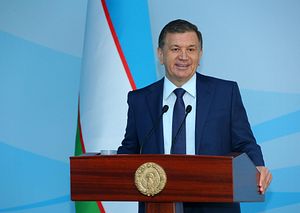Last week, in a speech branded by the government as a first of its kind, Uzbek President Shavkat Mirziyoyev addressed parliament, foreign diplomats, reporters, and the Uzbek people in a four-hour end-of-the-year address in which he laid out 2017’s accomplishments and outlined the challenges ahead.
The most interesting bit came about halfway through, when Mirziyoyev appeared to take aim at the powerful state security service. But comments about the finance ministry are also quite interesting, given the subsequent purge of the ministry.
The speech purposefully mirrored state of the nation speeches held by other world leaders, such as the annual American State of the Union or the annual Russian Presidential Address to the Federal Assembly. Such speeches present an opportunity for a leader to make clear an agenda and chart a course for the coming year.
With a four-hour speech, Mirziyoyev had a lot to say.
“Today, we are all witnessing an important change and a significant event in the political life of our beloved Motherland,” he began.
Mirziyoyev is at that center of that change. In September 2016, after the death of Uzbekistan’s first and previously only president, Islam Karimov, Mirziyoyev stepped from his long-time position as prime minister into the post of interim president, followed by election in a tightly controlled vote into the office in December 2016. In the year since, Mirziyoyev has put serious effort into altering how Tashkent engages, first with its neighbors and then internationally. As we’ve followed here at The Diplomat, positive movements have been most evident in economic and diplomatic matters, but peeling back the layers of a harsh security state has either not been a priority or has proven, internally, an uphill battle.
Security Matters
Mirziyoyev’s comments on the country’s heir to the Soviet KGB, the National Security Service, piqued the interest of regional observers. The head of the NSS, Rustam Inoyatov, “listened to the address in a hunched pose” according to Eurasianet. Inoyatov was long pegged as a possible successor to Karimov and remains the only Karimov-era senior security official still in office.
In a section devoted to outlining judicial and legal reforms aimed at strengthening the rule of law, Mirziyoyev decried torture, announced the provision of traffic police with body cameras, and said road patrol checkpoints between regions would be removed. But after outlining reform efforts, he admitted:
But it is still too early to say that of a number of laws, decrees and decisions in this regard has been fully implemented… The efforts of the prosecution authorities to ensure the priority of the rule of law in society are insufficient. The courts have not yet become a place of justice in any cases. We can’t say that the activities of all the staff in these agencies are fully mobilized to protect the constitutional rights of citizens.
… And most importantly we should not allow a single body to collect all the powers and resources and prevent violation of the principle of checks and balances.
Here Mirizyoyev made direct mention of the National Security Service, which has “been acting til the present day on the basis” of regulations approved 26 years ago. “This Regulation has not been changed for a quarter of a century and every ordinary issue has been regarded as a threat to national security which led to the groundless expansion of the agency’s powers.” (emphasis added)
Uzbekistan, as well as many of the other states in Central Asia, has long been lambasted by human rights and democracy advocates for its securitization of nearly every form of dissent. In the name of national security, journalists, writers, and others have been locked in prison, accused of advocating for the state’s overthrow.
A Purge at Finance
As noted above, Mirziyoyev’s speech was reportedly about four hours long. The English translation of the speech viewed by The Diplomat runs 41 pages. Beyond the comments on the security services, Mirziyoyev’s comments regarding the Finance Ministry are particularly interesting, given that three days after the speech Finance Minister Djamshid Kuchkarov fired about 50 department heads and deputies, as Bloomberg reported it, “to comply with an order from [the president] or risk losing his own job.”
On December 22, Mirziyoyev identified “outdated management system[s]” and “untimely introduction of effective mechanisms to support innovative ideas” as serious problems. After outlining how resource wealthy Uzbekistan is, how much potential it holds, Mirziyoyev lamented that mistakes have been made in the implementation of “promising large-scale projects” and “use of foreign loans for inefficient work…”
For example, many experts and specialists recognize that many loans taken in the country for 25 years did not yield economic benefits. For example the Ustyurt Gas Chemical Complex built in Karakalpakstan does not provide the expected economic benefits. Some “clever individuals” from the Ministry of Finance used to shout to the whole world that this is the best project in the world. But where is the result?
Looks like some “clever individuals” got fired.
As always, saying something needs to be reformed is easier than reforming, but the security service and the Finance Ministry are certainly spaces to watch in 2018, which Mirziyoyev declared to be the “year of support of proactive entrepreneurship, innovative ideas and technologies.”
Meanwhile, 2017 was “the year of dialogue with the people and human interests.”

































